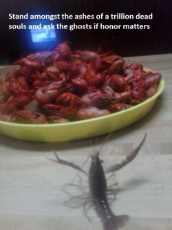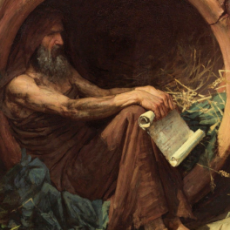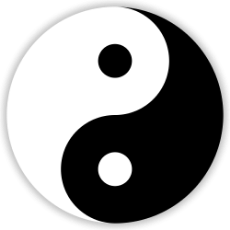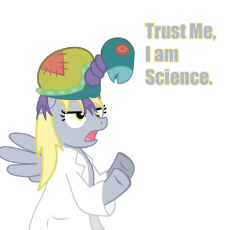What is human nature, /mlpol/? What are the characteristics that we all share? Are we inherently bad or good? Are we selfish? Are we tribal? How malleable are we? What motivates us? Just who and what are we?
/mlpol/ - My Little Politics
Archived thread
here you go
>>94301
Ooh, I've wanted to talk about this for a while. First and foremost, we generally look out for ourselves. That's not even human nature, that's the nature of most animals that are more advanced than insects. As for applying the label of "good" or "evil" to human nature, I think that is a fools errand. Every person is an individual, and I do believe they have free will. The Christian take almost gits the nail on the head in my opinion, as the story of Adam and Eve demonstrates that we all come with the POSSIBILITY for evil. However, it is still only a possibility, nothing is inherently true, except maybe for the behavior of self preservation.
Ooh, I've wanted to talk about this for a while. First and foremost, we generally look out for ourselves. That's not even human nature, that's the nature of most animals that are more advanced than insects. As for applying the label of "good" or "evil" to human nature, I think that is a fools errand. Every person is an individual, and I do believe they have free will. The Christian take almost gits the nail on the head in my opinion, as the story of Adam and Eve demonstrates that we all come with the POSSIBILITY for evil. However, it is still only a possibility, nothing is inherently true, except maybe for the behavior of self preservation.
>>94301
What is human nature, /mlpol/?
Chaos, we have equal potential to do good and equal potential do bad. So people are neither but a mix and some will chose to do more good then bad or more bad then good.
What are the characteristics that we all share?
The likelihood to become animals or become more. We share a lot of psychological characteristics and in group preferences.
Are we inherently bad or good?
Like I said we are inheritly both.
Are we selfish?
Same goes for this, we can do both and neither.
Are we tribal?
Yep
How malleable are we?
Not very. The environment can only do so much.
What motivates us?
Carrot or stick everything falls into one or the other.
Just who and what are we?
We are an in between of animals and angles. We have a soul but live in an animals body so we can do both good and bad at the whims of our will.
What is human nature, /mlpol/?
Chaos, we have equal potential to do good and equal potential do bad. So people are neither but a mix and some will chose to do more good then bad or more bad then good.
What are the characteristics that we all share?
The likelihood to become animals or become more. We share a lot of psychological characteristics and in group preferences.
Are we inherently bad or good?
Like I said we are inheritly both.
Are we selfish?
Same goes for this, we can do both and neither.
Are we tribal?
Yep
How malleable are we?
Not very. The environment can only do so much.
What motivates us?
Carrot or stick everything falls into one or the other.
Just who and what are we?
We are an in between of animals and angles. We have a soul but live in an animals body so we can do both good and bad at the whims of our will.
>>94301
>What is human nature, /mlpol/?
It's hard to judge what is part of our nature and what isn't. Of course there are some natural instincts but part of being a human is not submitting to them and often going against them. Is it part of our nature too, or is it "unnatural"? We don't really have supply of human that were raised completely "natural" to oberve them and too see our true natures. Everyone is more or less tainted by civiliation and cultures.
And then there are always exceptions, so even if you look at most based instincts you'll see those who are different than majority.
> Are we inherently bad or good? Are we selfish?
Depends what you consider as good and bad. If someone believe that people who don't share his religion are bad then yes, most of humans are bad. I don't really have any opinion here, our actions are based on situation, our emotional state in that moment etc. I don't think that there are many humans that can be called good or bad.
Same with being selfish, we care deeply about people close to us. And for different people there would be different definitions of who is "close". Do you care about someone more when he shares your race/language? Some people say yes and others no.
>What motivates us?
Whatever you find motivating. Of course there are some more universal things like love or leaving descendant after you, but while they apply to majority there are tons of people who don't care about that. And then you have people who don't really have any special motivation, they just push on out of habit.
>What is human nature, /mlpol/?
It's hard to judge what is part of our nature and what isn't. Of course there are some natural instincts but part of being a human is not submitting to them and often going against them. Is it part of our nature too, or is it "unnatural"? We don't really have supply of human that were raised completely "natural" to oberve them and too see our true natures. Everyone is more or less tainted by civiliation and cultures.
And then there are always exceptions, so even if you look at most based instincts you'll see those who are different than majority.
> Are we inherently bad or good? Are we selfish?
Depends what you consider as good and bad. If someone believe that people who don't share his religion are bad then yes, most of humans are bad. I don't really have any opinion here, our actions are based on situation, our emotional state in that moment etc. I don't think that there are many humans that can be called good or bad.
Same with being selfish, we care deeply about people close to us. And for different people there would be different definitions of who is "close". Do you care about someone more when he shares your race/language? Some people say yes and others no.
>What motivates us?
Whatever you find motivating. Of course there are some more universal things like love or leaving descendant after you, but while they apply to majority there are tons of people who don't care about that. And then you have people who don't really have any special motivation, they just push on out of habit.
>>94301
The different names we apply to human behaviour, good and bad, right and wrong are things we have done because the full scope of what we are is currently incomprehensible. We merely are, and we are the choices we make.
We see people like Jews pulling strings to the detriment of everyone else and label them as bad because on an instinctive level, we don't like to imagine we're capable of the same. Are we? How far would you go given the means to preserve your race? Does that make you bad?
The thought is frightening that behaviour we see as monstrous and evil is a capacity we possess within ourselves, but do not give in to. In a word, we are choice.
The different names we apply to human behaviour, good and bad, right and wrong are things we have done because the full scope of what we are is currently incomprehensible. We merely are, and we are the choices we make.
We see people like Jews pulling strings to the detriment of everyone else and label them as bad because on an instinctive level, we don't like to imagine we're capable of the same. Are we? How far would you go given the means to preserve your race? Does that make you bad?
The thought is frightening that behaviour we see as monstrous and evil is a capacity we possess within ourselves, but do not give in to. In a word, we are choice.
Good and evil are two sides of the same coin. There can't exist the light without the dark. Then, it goes in between. Men have the capacity to as greater good as they do greater evil. I cannot comment on human nature. I am not a sociologist, geneticist, psychologist, biologist, nor an anthropologist. But, I can say that in some of the gaps between judgment, especially when it deals with race, that there exists a dichotomy of in-group preference and out-group preference. The in-group preference is by default of course. Thus, the out-group preference can bring in many dangers among other possibilities. Too much out-group is destructive in my opinion. I will bring up the old Rome point, and leave it there. You know what happened.
>Just who and what are we?
Featherless bipeds.
>Just who and what are we?
Featherless bipeds.
>>95181
I'll disagree with you there. Frankly, evil is nothing but a lack of good, and a dualistic approach to the universe makes no sense to me. Light can exist without the dark, since darkness itself is absolutely nothing, just a lack of light.
I'll disagree with you there. Frankly, evil is nothing but a lack of good, and a dualistic approach to the universe makes no sense to me. Light can exist without the dark, since darkness itself is absolutely nothing, just a lack of light.
>>95380
>a dualistic approach to the universe makes no sense to me
>pic related
The divide in thought here comes in conceptualisation of the meaning of an action. I say that the possibility of being wrathful as you are kind, for instance, does not make one either kind nor wrathful. Merely the consequences make the individual at the time, for they are a vessel. And, can display both. Let's ponder on Ancient Greece, the highest and lowest of man in two regards; why, because they were as barbaric as they triumphant. In competition whether it be life or death, one would either humiliate their opponent or destroy all they hold dear in warfare. Yes, it would be hard to decide whether or not that these Greeks were evil or not from their deeds.
>>94336
Let's take your quote. In it, you describe the ambiguity of the possibility of evil, yet you leave self preservation with the assertion of being the least ambiguous. Well, the event of colonisation can be brought up here. The Matabele Wars could be an example of a battle for self preservation from the African side. The Africans lost, and their territory conquered. I pick this example, because in South Africa, the later effects of colonialization improved the living quality of the Africans under rule. Which in turn creates a nice duality here. You see, instead of being completely evil for pitting against the self preservation of another group, Britain by part was not wholly evil. Rather in the eyes of the Britons, they displayed heroic attributes; from their economic development, they did good by serving their and the Africans interests. They did good. Blurring your statement, which otherwise states that the battle for preservation is good, meaning as well threatening that self preservation (especially their own preservation is not threatened) is evil.
Which is why I make the point about group preferences. Also known as bias. Bias in defining what is good or evil. Regarding groups, this is ever more prevalent.
Another thing, your analogy about light and dark falls flat when you say that the lack of good is evil. Ignoring the case of inaction. If one is not doing good, he must be doing bad, right? I disagree. Because inaction negates all possibilities. Or, in the case of unwilling inaction, a fault of not acting being surely evil when one did not have the decision to or not to be.
>a dualistic approach to the universe makes no sense to me
>pic related
The divide in thought here comes in conceptualisation of the meaning of an action. I say that the possibility of being wrathful as you are kind, for instance, does not make one either kind nor wrathful. Merely the consequences make the individual at the time, for they are a vessel. And, can display both. Let's ponder on Ancient Greece, the highest and lowest of man in two regards; why, because they were as barbaric as they triumphant. In competition whether it be life or death, one would either humiliate their opponent or destroy all they hold dear in warfare. Yes, it would be hard to decide whether or not that these Greeks were evil or not from their deeds.
>>94336
Let's take your quote. In it, you describe the ambiguity of the possibility of evil, yet you leave self preservation with the assertion of being the least ambiguous. Well, the event of colonisation can be brought up here. The Matabele Wars could be an example of a battle for self preservation from the African side. The Africans lost, and their territory conquered. I pick this example, because in South Africa, the later effects of colonialization improved the living quality of the Africans under rule. Which in turn creates a nice duality here. You see, instead of being completely evil for pitting against the self preservation of another group, Britain by part was not wholly evil. Rather in the eyes of the Britons, they displayed heroic attributes; from their economic development, they did good by serving their and the Africans interests. They did good. Blurring your statement, which otherwise states that the battle for preservation is good, meaning as well threatening that self preservation (especially their own preservation is not threatened) is evil.
Which is why I make the point about group preferences. Also known as bias. Bias in defining what is good or evil. Regarding groups, this is ever more prevalent.
Another thing, your analogy about light and dark falls flat when you say that the lack of good is evil. Ignoring the case of inaction. If one is not doing good, he must be doing bad, right? I disagree. Because inaction negates all possibilities. Or, in the case of unwilling inaction, a fault of not acting being surely evil when one did not have the decision to or not to be.
The idea of human nature is a joke. The fact that we suffer is because we understand how too. If we would have stayed mindless animals and never evolved, the ideas of good and evil would have been trivial. Human nature as described by humans will never grow to anything useful, just more arguing and bullshit that will never cease until the day we forget… Or die…
Ignorance is truly bliss, but not to those from the outside.
Ignorance is truly bliss, but not to those from the outside.
>>94301
Human nature exists on a spectrum, which anons have rightly indicated comes down to choice, however context plays as big/significant of a role.
All individuals are capable of achieving or displaying either extreme if placed (by themselves or others) in a necessitating context.
Good and Evil are subjective concepts which individuals apply to "what they agree with" and "what they disagree with".
The three basic states for an individual are nescience, ignorance, and science. One does not choose nescience, but in response to stimuli and experience one does choose ignorance or science.
Human nature exists on a spectrum, which anons have rightly indicated comes down to choice, however context plays as big/significant of a role.
All individuals are capable of achieving or displaying either extreme if placed (by themselves or others) in a necessitating context.
Good and Evil are subjective concepts which individuals apply to "what they agree with" and "what they disagree with".
The three basic states for an individual are nescience, ignorance, and science. One does not choose nescience, but in response to stimuli and experience one does choose ignorance or science.
>>94301
We don't real have that much difference from animals except for our expanded problem-solving skills. A human has, in essence, two goals and one desire: survival and reproduction, and to thrive. This is the same for all life, humans simply achieve it in a radical and marvelous way, that has put us at the top of the food chain and caused animals to instinctively fear us.
We don't real have that much difference from animals except for our expanded problem-solving skills. A human has, in essence, two goals and one desire: survival and reproduction, and to thrive. This is the same for all life, humans simply achieve it in a radical and marvelous way, that has put us at the top of the food chain and caused animals to instinctively fear us.
Yes.
26 replies | 10 files | 1 UUIDs | Archived









 Ex: Type :littlepip: to add Littlepip
Ex: Type :littlepip: to add Littlepip  Ex: Type :eqg-rarity: to add EqG Rarity
Ex: Type :eqg-rarity: to add EqG Rarity 